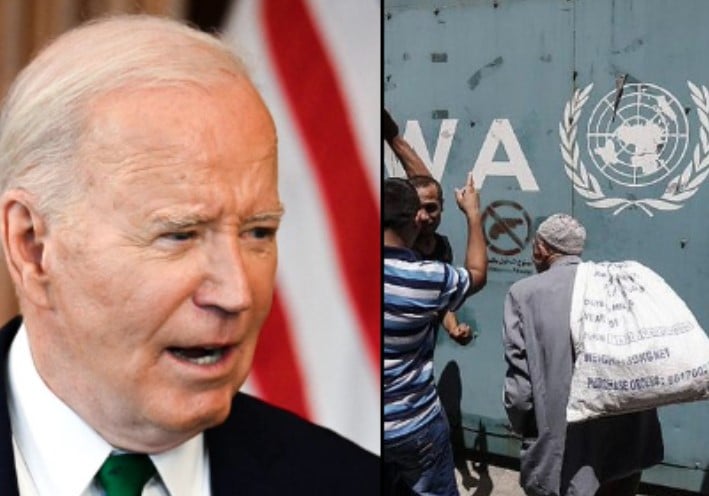
The memo offers a fresh window into the Biden administration’s decision to restore funding to UNRWA—one that shows the Biden State Department was well aware of the issues plaguing the embattled relief agency but opted to barrel forward with funds anyway.
By Adam Kredo, The Washington Free Beacon
When the Biden administration resumed funding to the United Nations relief agency for Gaza, it penned an internal memo aimed at defending UNRWA over its production of childhood “educational materials” that encourage violence and demonize Israel.
Some of those materials included references to “jihad” and Israeli “occupation”—terms that the Biden State Department wrote are “in line with U.N. principles” and only “viewed as inappropriate by some other audiences.”
The memo, obtained by the Washington Free Beacon through a records request from watchdog group Protect the Public Trust, came roughly two weeks after the Biden administration restored tens of millions of dollars in funding to UNRWA in April 2021 following a pause during President Donald Trump’s first stint in the White House.
Written by deputy assistant secretary Nancy Izzo Jackson for Secretary of State Antony Blinken, it addressed “examples of criticism” targeting UNRWA and laid out the State Department’s “response.”
The first section, titled, “Educational Materials,” notes that UNRWA made “home-learning ‘cards,’ based on the Palestinian Authority’s educational curriculum, to supplement textbooks sent home” during the COVID pandemic.
Some of those cards, according to a January 2021 report from research firm Impact-se, included the “encouragement of violence” and accused Israel “of deliberately dumping radioactive and toxic waste in the West Bank.”
UNRWA, the State Department wrote, had already removed or changed the content before the report’s release.
Shortly thereafter, however, Impact-se issued a follow-up report that identified additional “problematic cards,” including “references to jihad in and violence in Arabic language lessons for grades 6 and 9,” as well as references to “the Israeli occupation.”
UNRWA determined that those terms did not violate “U.N. principles,” according to the State Department memo, which states that only “some other audiences” may object to them.
“UNRWA removed or updated four cards while retaining a dozen cards it deemed as in line with U.N. principles (e.g. use of ‘jihad’ in the Quran or the term ‘occupation’) but are viewed as inappropriate by some other audiences,” the State Department said.
![]()
The memo offers a fresh window into the Biden administration’s decision to restore funding to UNRWA—one that shows the Biden State Department was well aware of the issues plaguing the embattled relief agency but opted to barrel forward with funds anyway.
It came just two months before the State Department privately assessed that Hamas was likely to benefit from more than $360 million in additional aid.
Those private assessments did not square with the administration’s public one. When announcing the funding restoration, Blinken said the assistance “serves important U.S. interests,” including “Israeli-Palestinian understanding.”
Behind closed doors, however, the State Department acknowledged concerns that UNRWA’s facilities are used by “terrorist groups” like Hamas.
Its memo referenced the 2020 discovery of tunnels beneath an UNRWA school and facility but said it remained “unknown which entity is responsible” for them.
![]()
Hamas, in the lead up to Oct. 7 and after it, relied heavily on a sophisticated tunnel system built beneath the Gaza Strip. Many of these networks connected to UNRWA schools, which were also used as Hamas military outposts.
UNRWA, the State Department maintained in its memo, “has been very transparent with the Israeli Ministry of Defense and with the United States when any such incidents occur.”
In a separate report prepared for Congress in 2021, the State Department documented “violations of UNRWA’s neutrality policies that are not consistent with the principle of neutrality.”
This included “slogans, graffiti, or other imagery on the inside or outside of UNRWA facilities.” More than 247 infractions were reported from 2019 to 2020 alone, the report states.
The report also noted that, despite a “strict no-arms policy” at all UNRWA facilities, the agency had reported “armed incursions, armed incidents, unauthorized use of UNRWA installations, weapons, and tunnels.”
![]()
To address these concerns, the State Department proposed sending even more money to UNRWA so that it could train staff how to uphold the “principles of neutrality, tolerance, anti-discrimination, and human rights.”
Michael Chamberlain, Protect the Public’s Trust’s director, said the newly unearthed State Department documents highlight how the former administration “tried to sell a wholly unrealistic version of UNRWA to Congress.”
“Even with all they knew, they shrugged and wrote the checks anyway,” he told the Free Beacon. “All the post-Oct. 7 reports about UNRWA staff participating in terrorist attacks and terror groups storing war materiel in UNRWA facilities were not surprising to anyone paying attention—not even to the officials in charge of the decision to resume sending money to this organization.”
While UNRWA’s ties to terrorism have long generated concerns in Congress, it was not until Oct. 7 that these issues hit the mainstream.
At least 19 UNRWA staff members participated in Hamas’s terror spree, leading the Biden administration and international donors to pause their funding.
Israel maintains that many more helped Hamas hide hostages and gave it access to UNRWA facilities across the Gaza Strip.
Israel formally banned UNRWA late last month, citing its role in the Oct. 7 attacks. Israeli officials are now barred from working with the aid agency and the country seeks an alternative route to provide aid in the Gaza Strip.
The post Biden State Dept privately downplayed use of ‘jihad’ and ‘occupation’ in UNRWA-made study materials, saying only ‘some other audiences’ view the terms as ‘inappropriate’ appeared first on World Israel News.